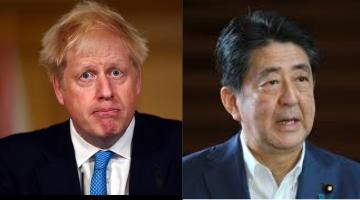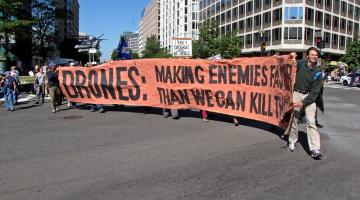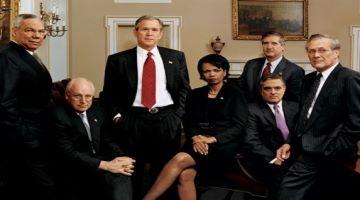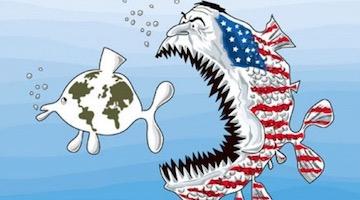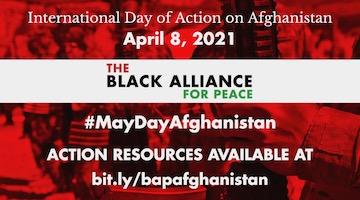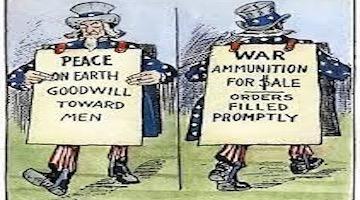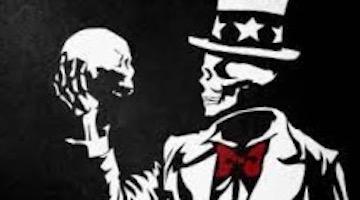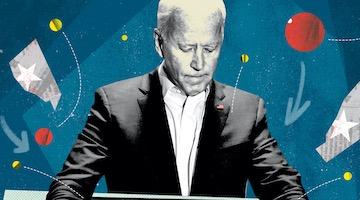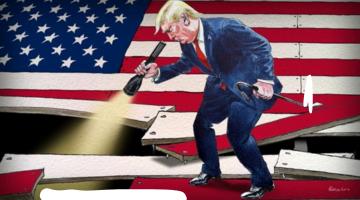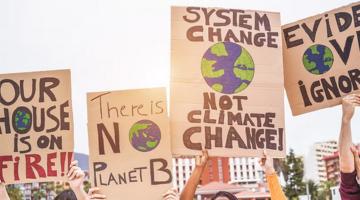BAR Book Forum: Jeremy Kuzmarov’s and John Marciano’s “The Russians are Coming, Again”
“The American people have been constantly manipulated and made to fear the Russian threat when it is the United States that has been the aggressive power.”
In this series, we ask acclaimed authors to answer five questions about their book. This week’s featured authors are Jeremy Kuzmarovand John Marciano. Kuzmarov is Jay P. Walker Assistant Professor of American History, University of Tulsa. Marciano is Professor Emeritus at SUNY Cortland. Their book is The Russians Are Coming, Again: The First Cold War as Tragedy, the Second as Farce.
Roberto Sirvent: How can your book help BAR readers understand the current political and social climate?
Jeremy Kuzmarov and John Marciano: Our book provides a historical perspective on contemporary affairs by showing how the Russo-phobia that has been prevalent in our political discourse over the last four to five years has deep and long historical roots, and has often been used by government leaders to turn public attention away from domestic inequalities by channeling societal resources towards the military sector. During the early Cold War, a period of labor militancy and momentum for the expansion of the New Deal was destroyed by McCarthyism and the Cold War.The Korean War brought on huge military budgets that have never left us and an expansion of the U.S. overseas military base network. These policies were underlain by exaggerated views about the Soviet Union which were stoked by political elites, who had worked for companies that reaped enormous profit from the permanent warfare state. The same forces are behind the renewed efforts to demonize Russian President Vladimir Putin and exaggerate the Russian threat, with serious adverse consequences for society that have already been evident. The consequences include a revitalization of the arms race, waging of proxy wars, and a further poisoning of the domestic political culture through the reinvigoration of a McCarthyist discourse and tactics.
“During the early Cold War, a period of labor militancy and momentum for the expansion of the New Deal was destroyed by McCarthyism and the Cold War.”
By reading the book, BAR readers may better understand the dangerous point at which we are now at, and how the American people have been constantly manipulated and made to fear the Russian threat when it is the United States that has been the aggressive power.Few Americans know that the United States actually invaded Soviet Russia in 1918 following the Bolshevik revolution in support of reactionary “white Generals” who committed legions of atrocities alongside U.S. troops and their allies. Since then, the United States has continued to antagonize the Soviet Union/Russia, including expanding NATO after the fall of the USSR close to her borders, which has invited counter-reactions. If we see the world from Russia’s point of view, we can better understand its behavior and work towards peaceful relations. By critically scrutinizing our own actions, we can also see where history is repeating itself and try to alter our trajectory.
What do you hope activists and community organizers will take away from reading your book?
We hope that the book can give a historical perspective on U.S.-Russia relations and help readers to understand the negative consequences of the Cold War and the necessity of opposing a new one. Activists concerned with domestic inequality and police militarization need to connect these phenomena with U.S. imperialism abroad and focus their energies on challenging the system in its totality. Drawing on the analysis of the late Seymour Melman, we chronicle how heavy military spending during the Cold War warped the U.S.-political economy by channeling investments away from civilian industry and social programs, while stifling democratic development. The book further details the insanity of the Cold War arms race and its pernicious effects in the former Third World, and locates the roots of the modern surveillance state in the Red Scares.
“Backed by the corporate media, these interests will consistently invoke the specter of the Russian threat as a means of defusing social movement organizing and class conflict.”
A key aim of the book is to remind activists that they should not succumb to the dominant Russo-phobia, as some on the left have, as it is driven by elite interests whose agenda is attached to that of the military-industrial complex. Backed by the corporate media, these interests will consistently invoke the specter of the Russian threat as a means of defusing social movement organizing and class conflict, and as justification for sustaining astronomically high military budgets.
We hope our book will promote a sense of moral outrage that will compel activists to resist the new Cold War as a top priority and demand an end to Russo-phobia, neo-McCarthyism, and Putin-bashing, by keeping the focus on the systemic ills that BAR has addressed in its articles. The book includes discussion of visionary historical figures like Henry Wallace, FDR’s Vice President, who followed the model of Abraham Lincoln in pursuing a strategy of peaceful alliance with Russia, and other Cold War dissenters like Paul Robeson, Scott Nearing, W.E.B Du Bois, Claudia Jones, and Woody Guthrie who spoke out during the dark days of McCarthyism and can provide an inspiration to activists today.
We know readers will learn a lot from your book, but what do you hope readers will un-learn? In other words, is there a particular ideology you’re hoping to dismantle?
I think we’re trying to dismantle the ideology of the Cold War and national security state, American exceptionalism, and the dominant Russo-phobia. We show how these ideologies are pernicious and based on faulty logic, and have resulted in highly destructive policies which are being reinvigorated. We also point to a suppressed history of cooperation between the United States and Russia that dates to the 19thcentury when Russia sent a naval gunboat at the request of the Lincoln government to block threatened British and French intervention on behalf of the Confederacy during the U.S. Civil War. The popular image considers Russia as a menacing and authoritarian nation, however, we debunk this stereotype and aim to remind readers of a history of cooperation which can be a model for the present day.
Who are the intellectual heroes that inspire your work?
Noam Chomsky, Edward S. Herman, Alfred W. McCoy, Peter Dale Scott, Jerry Lembcke, H. Bruce Franklin, Douglas Valentine, William Appleman Williams, Gabriel Kolko, Chalmers Johnson, Fred Branfman, Wilfred Burchett, Norman G. Finkelstein, William Blum, Guy Mettan, Bob Moses, Marilyn Young, C. Wright Mills, Howard Zinn, W.E.B. Du Bois, and Paul Robeson.
In what way does your book help us imagine new worlds?
It helps imagine a new world by first dissecting the flawed logic, prejudice and plutocratic interests which resulted in the Cold War and the disasters that this portended, and how the history is being repeated today. We in turn spotlight Progressive activists and leaders who spoke out against the misappropriation of government resources and injustices, and envisioned an alternative world order underlain by peaceful cooperation. It is the memory of the latter that can serve as a source of inspiration, and provide us with the courage to speak out again.
In 1946, while serving as commerce secretary, Henry Wallace gave a speech in which he advocated dismantling U.S. air bases around the world, and argued that no nation should spend more than 15 percent of its budget on the military. The United States, he said, could easily ensure cooperation with the Soviets if they made clear that “we are not planning for war against her,” and had “no more business in the political affairs of Eastern Europe than Russia has in Latin America.” Wallace ended the speech by calling on Americans “who look on this war-with-Russia talk as criminal foolishness… [to] carry our message direct to the people—even though we may be called communists because we dare to speak out.”[1]
This is the kind of speech and leader we need, and ought to demand. Bernie Sanders and his supporters need to connect the dots between domestic inequality and oppression, and overseas militarism, and speak out against the new Cold War and attendant arms races and proxy wars as in Syria. Wallace remains a good model for doing that.
Roberto Sirvent is Professor of Political and Social Ethics at Hope International University in Fullerton, CA. He also serves as the Outreach and Mentoring Coordinator for the Political Theology Network. He’s currently writing a book with fellow BAR contributor Danny Haiphong called American Exceptionalism and American Innocence: The Fake News of U.S. Empire.
[1] See Oliver Stone and Peter Kuznick, An Untold History of the United States(New York: Gallery Books, 2012), 201, 202.

